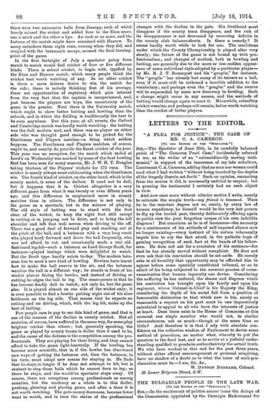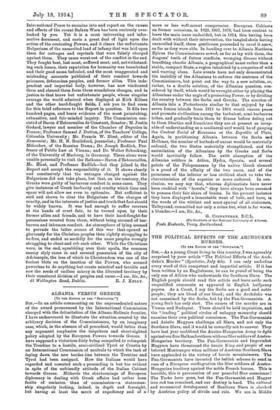THE BULGARIAN PEOPLE IN THE LATE WAR. [To TIIIC EDITOR
or THE " SPECTATOR:1
SIR,—In the excitement of politics nearer home the doings of the Commission appointed by the Carnegie Endowment for
International Peace to examine into and report on the causes and effects of the recent Balkan Wars has been curiously over- looked by you. Yet it is a most interesting and infor- mative document, and casts a great deal of light upon the action of the contesting Powers, and it clears the unfortunate Bulgarians of the unmerited load of infamy that was laid upon them for outrages and reprisals that were falsely charged against them. They came worst out of the conflict in the end. They fought best, lost most, suffered most, and, notwithstand- ing such losses, their reputation for humanity was besmirched and their good name befouled, and the most exaggerated and misleading accounts published of their conduct towards prisoners, defenceless peoples, and former allies. This inde- pendent and impartial body, however, has now vindicated them and cleared them from these scandalous charges, and in justice to that brave but unfortunate people, whose singular courage the world admired when displayed at Kirk Kilisse and the other hard-fought fields, I ask you to find room for this brief reference to the Report in question. It fills two hundred pages, and bears evidence of the most painstaking, exhaustive, and fair-minded inquiry. The Commission con- sisted of Baron d'Estournelles de Constant, Senator; M. Justin Godard, lawyer and member of the Chamber of Deputies in France ; Professor Samuel J. Dutton, of the Teachers' College, Columbia University ; Mr. Francis W. Hirst, editor of the Economist; Mr. H. N. Brailsford, journalist; Professor Paul Milioukov, of the Russian Duma ; Dr. Joseph Redlich, Pro- fessor of Public Law at Vienna; and Dr. Walter Schucking, of the University of Marburg, in Germany. Three alone were unable personally to visit the Balkans—Baron d'Estournelles, Mr. Hirst, and Professor Redlich—but they joined in the Report and accept the responsibility of it. It shows clearly and conclusively that the outrages charged against the Bulgarians did not take place, but that, on the contrary, the Greeks were guilty of barbarous conduct in some cases. They give instances of Greek barbarity and cruelty which time and space will not allow me even to epitomize. But sufficient is said and shown to clear the Bulgarians of the charges of cruelty, and in the interests of justice and truth that fact should be widely known. It was bad enough to suffer reverses at the hands of cruel fate, to be turned upon by their former allies and friends, and to have their hard-fought-for possessions wrested from them, without being accused of bar- barous and inhuman conduct. An atmosphere of lying seemed to pervade the latter scenes of this war that opened so gloriously for the Christian peoples then rightly struggling to be free, and ended so sordidly for the same peoples wrongly struggling to cheat and rob each other. While the Christians were, in the end, squabbling over their spoils, the common enemy slyly came in and secured possession of the city of .Adrianople, the loss of which to Christendom was one of the foulest blots on the inaction of the Powers, who seemed powerless to do anything but create mischief and trouble and sow the seeds of endless misery in the liberated territory by their unnatural division of peoples and races.—I am, Sir, &c., 45 Wellington Road, Dublin. R. J. KELLY.











































 Previous page
Previous page